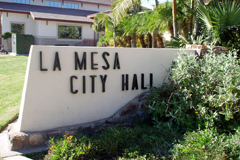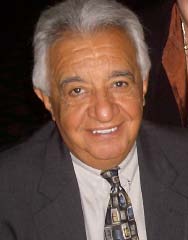City faces low reserves; bond rating, city jobs at stake if measure
fails to pass
By Kristin Hobbs Kjaero
 The proposition
The proposition
Proponents call it the “Vital City Services Measure,” and opponents
call it a “Pension Tax.” The impartial ballot analysis identifies
it as a “general tax,” which means revenue would go into La Mesa’s
general fund and “the City would not be legally bound to use this tax
revenue for any special purpose or for any specifically identified special
services, facilities or programs.”
On November 4, La Mesa residents will decide if they want to add a three-quarters
of one cent tax increase for a period of 20 years, raising the current rate
to 8.5%.
|
La Mesa Prop L basics:
Further Resources: To read the full text Impartial Analysis Ballot supporters Ballot opponents |
Under California law sales taxes do not apply to groceries and prescription
medication, while all vehicle purchases are taxed based on a buyer’s
residence regardless of place of purchase.
City Finances
La Mesa was forecasting a $4 million deficit for its 2007-2009 budget before
the recent financial market upheaval.
 Mayor Art Madrid stated, “Our 6 million reserves are down to $37,000.
Mayor Art Madrid stated, “Our 6 million reserves are down to $37,000.
Furthermore we have been informed by Moody’s rating service last time
we issued bonds that, given the size of our city and that sales tax is our
one source of revenue, we have to increase our reserves to more like 45% if
we’re going to issue bonds again.”
Madrid explained, “Even if Prop L passes we’ll still have to lay
off employees in the short term, because it would take 6-10 months to get the
revenues. There’s no way we can operate at a deficit, and most of our
expenses are personnel.”
The Arguments
Both sides agree it’s not a question of if there will be cuts
at this point. The question is how, and how much, and the
argument centers on two issues: employee compensation and sales tax leakage.
Seventy-five percent of the City’s budget goes to salary and benefits.
For decades, City employees have received both Social Security and CalPERS
pensions, for which the City pays both employer and employee portions.
"They dug themselves into a hole. They gave a benefit that they just
can't afford," Richard Rider, of San Diego Tax Fighters, said, noting
that by the time both pensions are added together, “Pensions are 3-5
times what you get in the private sector, and job security well above.” Rider
is concerned that "Payroll, the 75% of the budget where the money goes,
is sacrosanct, it's not on the table. If you're not willing to put that on
the table, you'll never bring that [deficit] back in."
The current round of negotiations with employee unions has just concluded,
and there will be no adjustments from previous contracts.
Madrid feels the sales tax is important to preserve the level of service now
provided. He stated, “If you’re not at the table, you’re
on the menu, you don’t even have the opportunity to be competitive. We
have the lowest ratio of employees to citizen of any jurisdiction in the region.
We have been able to get to this level of service through grants and people
have gotten used to it. As these grants are drying up, we have to make cuts.”
According to City Manager Sandra Kerl, “We have the lowest salaries
in San Diego County, and our retirement package is consistent with more than
three-quarters of the county.”
The other main issue opponents bring up is sales tax leakage – that
is consumers choosing to shop elsewhere rather than pay the additional sales
tax. In an effort to generate more sales tax revenue, the City recently hired
the Buxton Company to help bring large retailers to the City.
Rider argues that Prop L would undermine the attempt to attract new business
by “encouraging people to go shop somewhere else.” He points out
that sales tax is charged on gasoline, and believes residents will gas up when
they’re at work or elsewhere.
Proponents argue that as a local city tax, by law the revenues would stay
in the City.
Kerl says the City looked for studies on tax leakage but found nothing definitive;
the anecdotal information they found was inconclusive.
City Councilman Mark Arapostathis summed up why Prop L was put on the ballot. “This
is the way of life in La Mesa, and do you want it to stay that way? That’s
all we’re asking. We’ll live through this if it doesn’t pass.
People will lose their jobs; that’s not a scare tactic, but it’s
just the way it’s going to be.”
Freelance writer Kristin Hobbs Kjaero is a lifelong resident of La Mesa.











Comments
La Mesa sales tax increase
A fair and balanced article. Much more than most.
I might add that, if this tax passes, La Mesa will have the second highest sales tax rate in the county -- behind National City and (if Prop J passes) El Cajon. Most La Mesa working folks are employed in other cities where the sales taxes are lower (notably San Diego). This increases the chances that La Mesans be doing their major shopping there rather than in their city of residence.
For more info on who supports and who opposes this tax -- and why -- go to our opposition website: www.NoLaMesaSalesTax.org